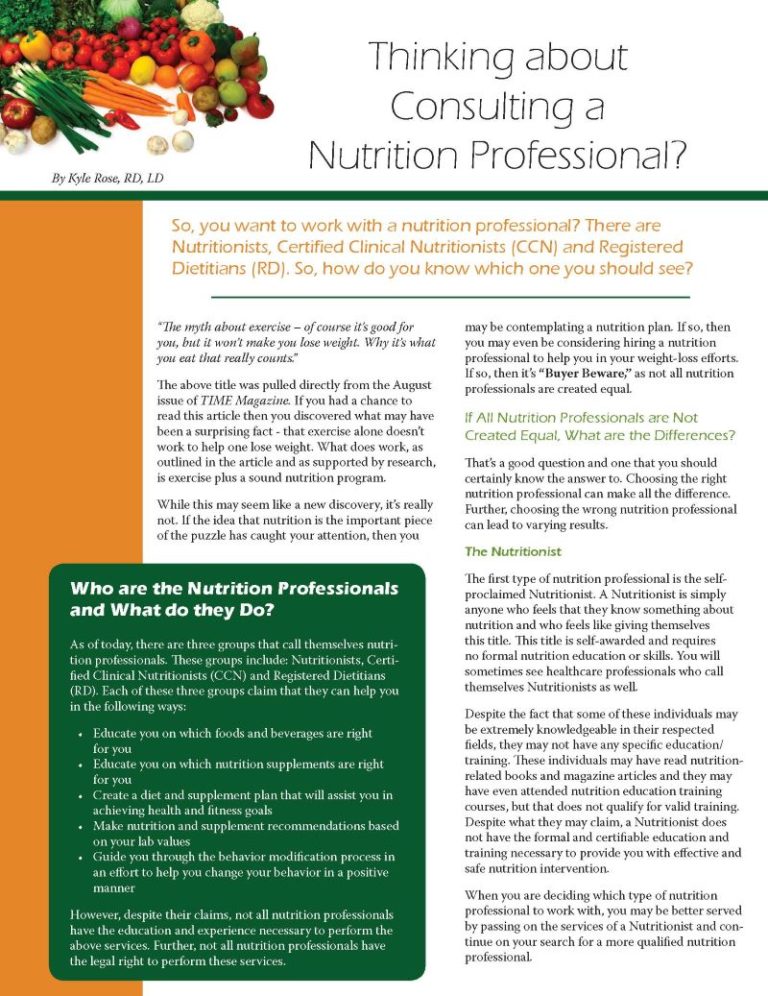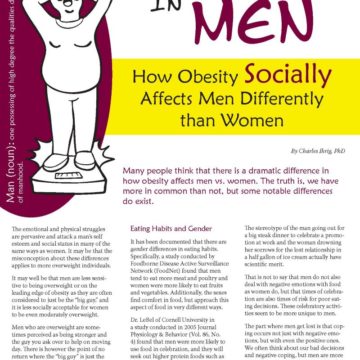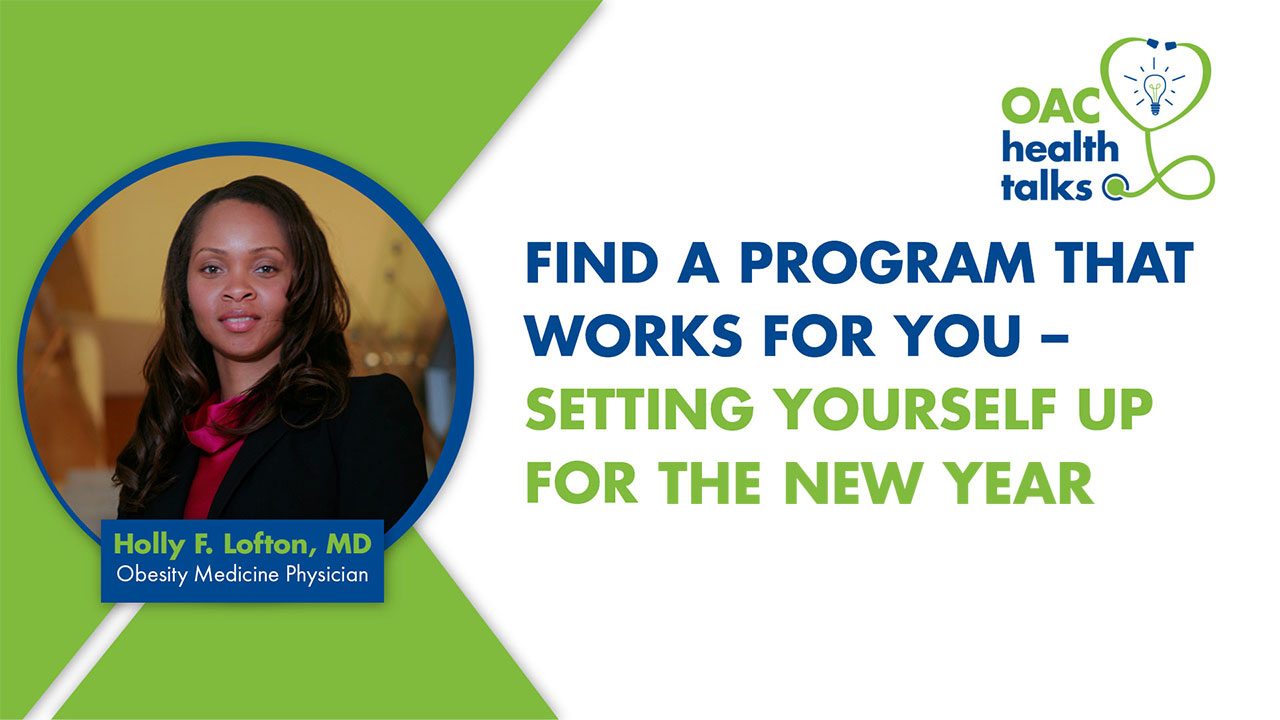Thinking about Consulting a Nutrition Professional? If so, then Buyer Beware!


by Kyle Rose, RD, LD
Winter 2010
So, you want to work with a nutrition professional? There are Nutritionists, Certified Clinical Nutritionists (CCN) and Registered Dietitians (RD). So, how do you know which one you should see?
“The myth about exercise – of course it’s good for you, but it won’t make you lose weight. Why it’s what you eat that really counts.”
The above title was pulled directly from the August issue of TIME Magazine. If you had a chance to read this article then you discovered what may have been a surprising fact – that exercise alone doesn’t work to help one lose weight. What does work, as outlined in the article and as supported by research, is exercise plus a sound nutrition program.
While this may seem like a new discovery, it’s really not. If the idea that nutrition is the important piece of the puzzle has caught your attention, then you may be contemplating a nutrition plan. If so, then you may even be considering hiring a nutrition professional to help you in your weight-loss efforts. If so, then it’s “Buyer Beware,” as not all nutrition professionals are created equal.
If All Nutrition Professionals are Not Created Equal, What are the Differences?
The Nutritionist
The first type of nutrition professional is the self-proclaimed Nutritionist. A Nutritionist is simply anyone who feels that they know something about nutrition and who feels like giving themselves this title. This title is self-awarded and requires no formal nutrition education or skills. You will sometimes see healthcare professionals who call themselves Nutritionists as well.
Despite the fact that some of these individuals may be extremely knowledgeable in their respected fields, they may not have any specific education/training. These individuals may have read nutrition-related books and magazine articles and they may have even attended nutrition education training courses, but that does not qualify for valid training. Despite what they may claim, a Nutritionist does not have the formal and certifiable education and training necessary to provide you with effective and safe nutrition intervention.
When you are deciding which type of nutrition professional to work with, you may be better served by passing on the services of a Nutritionist and continue on your search for a more qualified nutrition professional.
The Certified Clinical Nutritionist
Now that sounds so official that you can rest assured that anyone with this title behind their name is qualified to practice nutrition, right? Well, unfortunately despite their claims to the contrary, a CCN may not have the education and training necessary to provide effective nutrition intervention.
The Web site that outlines the certification process of a CCN is www.cncb.org. A review of this Web site reveals the following facts about this certification:
To obtain the CCN certification a person must:
- Have a professional degree in a licensed healthcare field such as: MD, DO, DDS, DPM, DO, RN, etc.
- Complete 15 online courses of Core Nutrition Coursework in classes such as: Intro to Nutrition, Nutrition and Disease, Nutrition and Aging , etc.
- Pass the Certified Clinical Nutritionist exam.
- To maintain their CCN certification a person must :
- Complete 40 hours of continuing education every two years.
- Attend two CCN annual Scientific Symposiums.
- Pay an annual maintenance fee.
- Recertify every 5th year via annual study textbooks with an open book exam.
Now at first glance, the requirements to become a CCN appear sound, so what’s the problem? Despite what seems like sound qualifications, here are things to consider:
- CCNs are not required to complete a supervised internship.
- CCNs are not regulated/credentialed by an
independent 3rd party. - CCNs are not licensed in any state.
Do your homework on health degrees and what seems like a sound education in nutrition. Continue searching for a nutrition professional that has the training, education and certification that supports what they are claiming.
The Registered Dietitian
Before most people get to the point to where they see an RD they have seen other nutrition professionals. An RD is the only nutrition professional who has the education, training and legal authority to practice safe and effective nutrition intervention. If you ask your doctor which nutrition professional they recommend that you see, most will recommend an RD because they know that an RD will provide quality care for their patients.
To become an RD, a potential candidate must undergo a rigorous training process that includes:
- Obtain a bachelor’s degree in dietetics (or master’s degree if you already have another health-related bachelor’s degree).
- Complete all Didactic Program in Dietetics classes.
- Be admitted to a CADE-accredited Dietetic Internship and complete at least 900 hours of supervised practice.
- Apply for Registration Eligibility with the CDR (a 3rd party credentialing organization that verifies the quality of an applicant’s education and training).
- Take and pass the CDR approved Registered Dietitian Exam.
- Apply for and obtain a license in most states.
- Complete continuing education and apply for recertification every five years.
In most states, RDs must also obtain a Licensed Dietitian (LD) certification in order to practice nutrition. To become an LD, a candidate must be an RD and pay a yearly application fee. Once an RD receives their LD certification, they must complete 12 or more hours (depending on the state) of continuing education per year.
As you can see, the education and training of an RD differs from the rest of the nutrition professionals. Their education and experience provides safe and effective counseling. So, when you are ready to get your nutrition plan on track, be sure to consider all these options and decide what is best for you and your health.
Who are the Nutrition Professionals and What do they Do?
As of today, there are three groups that call themselves nutrition professionals. These groups include: Nutritionists, Certified Clinical Nutritionists (CCN) and Registered Dietitians (RD). Each of these three groups claim that they can help you in the following ways:
- Educate you on which foods and beverages are right for you
- Educate you on which nutrition supplements are right for you
- Create a diet and supplement plan that will assist you in achieving health and fitness goals
- Make nutrition and supplement recommendations based on your lab values
- Guide you through the behavior modification process in an effort to help you change your behavior in a positive manner
However, despite their claims, not all nutrition professionals have the education and experience necessary to perform the above services. Further, not all nutrition professionals have the legal right to perform these services.
That’s a good question and one that you should certainly know the answer to. Choosing the right nutrition professional can make all the difference. Further, choosing the wrong nutrition professional can lead to varying results.
About the Author:
Kyle Rose, RD, LD, is a Bariatric Dietitian for Bariatric Solutions in Decatur, Texas. Kyle is also a co-owner of Head 2 Toe Nutrition and Fitness, LLC. Head 2 Toe offers nutrition programs and fitness boot camps to assist their clients in getting healthy from Head 2 Toe.
by Sarah Muntel, RD Spring 2024 Spring has sprung, bringing sunnier and warmer days! For many, this…
Read ArticleWith the holidays behind us and 2022 now here, many of us are ready to tackle our…
View Videoby Kristen Smith, MS, RDN Winter 2022 When you decide to change your dietary habits, it can…
Read Article










